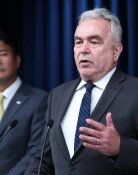[Opinion] Let U.S. Troops Stay
Despite glaring differences in national power, Germany and Korea have been subjects of comparison for long time. When the Korean economy grew dramatically in the 1960s and the 1970s, many countries cited `the miracle of the Han River` in comparison to `the miracle of the Rhine.` Koreans felt companionship with Germans when the country was divided between West and East Germany. When the two Germanys were reunited, Koreans were eager to learn a lesson from the country. The fact that German was the second most popular foreign language taught in schools next to English also reflects the affinity Koreans feels toward Germans.
The two countries are in similar position again related to withdrawal and relocation of U.S. troops. U.S. troops stationed in Germany and those stationed in Korea are emerging as core parts of Washington`s overseas force realignment strategy. As 37,000 troops here have played a role of deterring a war in the Korean Peninsula, 70,000 stationed in Germany have served as a key force in U.S. military presence in Europe. Recently both Koreans and Germans got the nerve of Washington with anti-American demonstrations and anti-war campaign respectively. Then, are there similarities or differences in the way the two countries react to realignment plans?
Mayors from thirteen German cities visited Washington and met with U.S. officials and lawmakers. They lobbied not to close bases in their cities and reduce the least of forces. Mayor of Kaiserslautern said at an interview with a German broadcaster, ˝If U.S. troops leave the city, it will lead to some $1 billion losses in revenue.˝ Given the figure, they must have lobbied hard in Washington, stressing the need for U.S. presence. The German mayors said at the end of their visit that they expected reductions, if any, would be small in scale. They are seeking to protect their interests against the reduction plan, taking an economic approach to the issue. Then, why can`t we plead not to remove the troops?
There are community leaders organizations in those areas U.S. troops stationed. They are design to discuss issues related to U.S. presence. It seems, however, that they are not organized strongly enough to lobby to the U.S. government. Seeing the presence of U.S. troops only from military perspectives is short-sighted. U.S. troops in Korea spent $750 million last year alone on personnel and procurement. Even taking $480 million covered by the Korean government into consideration, the figure still reaches $270 million. Financial benefits that accrue from the presence of U.S. troops, indeed, are real and substantial. Do we really have to stick to street demonstrations against these benefits? Leaders of local governments must learn a lesson from the German mayors.
Bang Hyung-nam, Editorial Writer, hnbhang@donga.com
Headline News
- Med professors announce intention to leave hospitals starting Thursday
- Bridge honoring Sgt. Moon Jae-sik unveiled in Pennsylvania
- Chief of Staff Chung tells presidential secretaries to stay away from politics
- US FTC bans noncompete agreements
- N. Korea launches cyberattacks on S. Korea's defense companies







